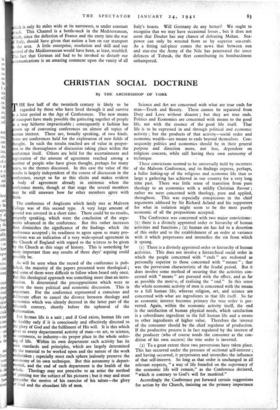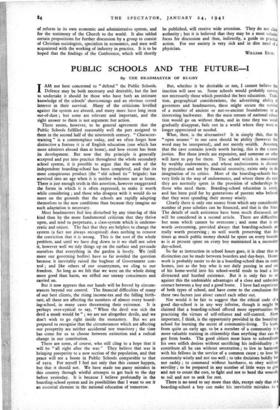CHRISTIAN SOCIAL DOCTRINE
By THE ARCHBISHOP OF YORK
HE first half of the twentieth century is likely to be regarded by those who have lived through it and survive a later period as the Age of Conferences. The new means transport have made possible the gathering together of people a way hitherto impracticable ; consequently a fashion has rown up of convening conferences on almost all topics of uman interest. These are, broadly speaking, of two kinds. ome are conferences held for the exploration of new fields of ought. In such the results reached are of value in propor- on to the thoroughness of discussion taking place within the onference itself. Others are held for the ascertainment and egistration of the amount of agreement reached among a umber of people who have given thought, perhaps for many ears, to the themes discussed. In this case the value of the esults is largely independent of the course of discussion in the onference, except so far as this elicits and makes evident body of agreement already in existence when the onference meets, though at that stage the several members ay be still unaware how far other members agree with em.
The conference of Anglicans which lately met at Malvern liege was of this second type. A very large amount of round was covered in a short time. There could be no results, roperly speaking, which were the conclusion of the argu- ents advanced in the conference. But this rather increases art diminishes the significance of the findings which the onference accepted ; its readiness to agree upon so many pro- ositions was an indication of a very wide-spread agreement in he Church of England with regard to the witness to be given v the Church at this stage of history. This is something far ore important than any results of three days' arguing could ossibly be.
As will be seen when the record of the conference is pub- shed, the majority of the papers presented were theological ; d some of them were difficult to follow when heard only once. ut this theological approach was something more than an intro- uction. It determined the presuppositions which were to overn the more political and economic discussion. This is portant. For the conference represented a conscious and eliberate effort to cancel the divorce between theology and onomics which was silently decreed in the latter part of the teenth century, shortly before the upheaval of the eformation.
For human life is a unit ; and if God exists, human life can e healthy only if it is consciously and effectively directed to e glory of God and the fulfilment of His will. It is this which Ives to every departmental activity of man—to art, to science, o commerce, to industry—its proper place in the whole order- g of life. Within its own department each activity has its wn standards and principles, which are largely determined Y the material to be worked upon and the nature of the work ndertaken ; especially must each sphere jealously preserve the utonomy of its own technique. But this autonomy is depart- ental, and the end of each department is the health of the hole. Theology may not prescribe to an artist the method f painting nor the subject of his pictures ; but it may and must rescribe the motive of his exercise of his talent—the glory God and the abundant life of men. Science and Art are concerned with what are true ends for man—Truth and Beauty. These cannot be separated from Duty and Love without disaster ; but they are true ends. Politics and Economics are concerned with means to the good life, not with the essence of the good life itself. That life is to be expressed in and through political and economic activity ; but the products of that activity—social order and economic wealth—are means to ends beyond themselves. Con- sequently politics and economics should be in their general purpose and direction more, not less, dependent on religious concern, while still having their own autonomy of technique.
These convictions seemed to be universally held by members of the Malvern Conference, and its findings express, perhaps, a fuller linking-up of the religious and economic life than so large a gathering has achieved in our country for a very long time past. There was little sense of transition from pure theology to an economics with a mildly Christian flavour ; rather we were concerned with theology, pure and applied, throughout. This was especially conspicuous in the chief arguments adduced by Sir Richard Acland and his supporters for what in isolation might seem to be the most purely economic of all the propositions accepted.
The Conference was concerned with two major convictions: (t) there is a divinely appointed order or hierarchy of human activities and functions ; (2) human sin has led to a desertion of this order and to the establishment of an order at variance with it which perpetuates and intensifies the sin from which it sprang.
(r) There is a divinely appointed order or hierarchy of human activities. This does not involve a hierarchical social order in which the people concerned with " ends " are reckoned as personally superior to those concerned with " means " ; that was the perversion characteristic of the feudal period. But it does involve some method of securing that the activities con- cerned with " means " are pursued with the effect, and as far as possible the moti,ie, of realising the "end." In this sense the whole economic activity of men is concerned with the means to a full human life, whereas religion, art, and science are concerned with what are ingredients in that life itself. So far as economic interest becomes primary the true order is per- verted. Again, within the economic activity itself, the end is the satisfaction of human physical needs, which satisfaction is a subordinate ingredient in the full human life and a means to other ingredients of higher value. Therefore the interest of the consumer should be the chief regulator of production. If the productive process is in fact regulated by the interest of the producer (who of course needs the consumer as the con- dition of his own success) the true order is inverted.
(2) To a great extent these two perversions have taken place. This has occurred under the pressure of sectional self-interest ; and having occurred, it perpetuates and intensifies the influence of that self-interest. So long as that order is unchanged in all relevant respects, "a way of life founded on the supremacy of the economic life will remain," as the Conference declared, "which is contrary to God's will for mankind."
Accordingly the Conference put forward certain suggestions for action by the Church, insisting on the primary importance of reform in its own economic and administrative system, and for the testimony of the Church to the world. It also tabled certain propositions for further discussion by a group to consist of Christian sociologists, specialists in economics, and men well acquainted with the working of industry in practice. It is to be hoped that the findings of the Conference, which will shortly be published, will receive wide attention. They do not claiz authority ; but it is believed that they may be a most valuable focus for discussion and thus, indirectly, a guide to practical action. For our society is very sick and in dire need of physician.
WILLIAM DOR:































 Previous page
Previous page